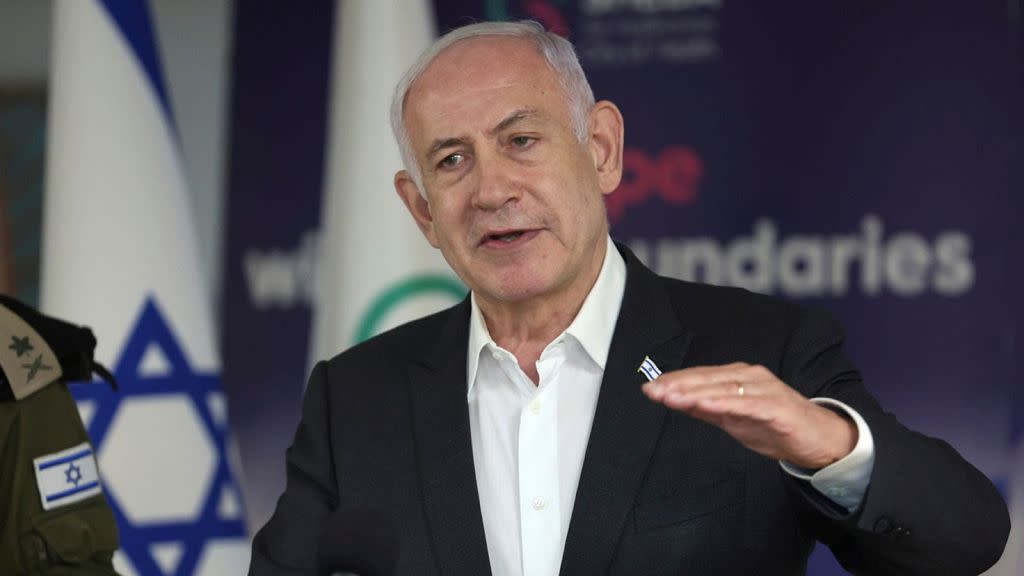Netanyahu slams military plans for daily 'tactical pauses' to allow aid into Gaza

Israel's Prime Minister Benjamin Netanyahu has reportedly criticised plans announced by the military to implement suspensions of hostilities along one of the main roads into Gaza to facilitate deliveries of aid.
On Sunday the army said a 'tactical pause' would begin in the Rafah area at 8 am and remain in effect until 7 pm local time. The pauses would take place every day until further notice.
The break is intended to allow aid trucks to reach the nearby Israel-controlled Kerem Shalom crossing, the main entry point for incoming aid, and travel safely to the Salah a-Din highway, a main north-south road, to deliver supplies to other parts of Gaza, the military said. It said the pause was being coordinated with the UN and international aid agencies.
The crossing has suffered from a bottleneck since Israeli ground troops moved into Rafah in early May.

But one Israeli official said that Netanyahu had made it clear to his military secretary that the pauses were "unacceptable to him".
The official said that Netanyahu received assurances that “there is no change” in the military's policy and “fighting in Rafah continues as planned.” The official spoke on condition of anonymity because he wasn't authorised to speak with the media.
Israeli television stations later quoted Netanyahu as criticizing the military: “We have a country with an army, not an army with a country.”
But neither Netanyahu nor the army cancelled the new arrangement. While the army insisted “there is no cessation of fighting” in southern Gaza, it also said the new route would be open during daytime hours “exclusively for the transportation of humanitarian aid.”
The military announcement was also slammed by National Security Minister Itamar Ben-Gvir who said whoever made the decision was a "fool" and should lose their job.
This dispute is the latest in a string of clashes between members of Netanyahu's coalition and the military over how the war, now in its ninth month, is conducted.
It comes a week after centrist former general Benny Gantz quit the government, saying Netanyahu had no effective strategy in Gaza.
Humanitarian crisis
The UN has repeatedly reported that Gaza is experiencing a humanitarian crisis, with widespread hunger and hundreds of thousands of people on the brink of famine.
Israel has come under increasing pressure to ease the humanitarian burden on Gaza.
From May 6 until June 6, the UN received an average of 68 trucks of aid a day, according to figures from the UN Humanitarian Office, known as OCHA. That was down from 168 a day in April and far below the 500 trucks a day that aid groups say are needed.
Humanitarian needs have only grown as more than 1 million Palestinians have crowded into southern and central Gaza.
COGAT, the Israeli military body that oversees aid distribution in Gaza, says there are no restrictions on the entry of trucks. It says more than 8,600 trucks of all kinds, both aid and commercial, entered Gaza from all crossings from May 2 to June 13, an average of 201 a day. But much of that aid has piled up at the crossings and not reached its final destination.
UNRWA has posted that less than a third of the health centres in Gaza are operational and that over 50,000 children require treatment for acute malnutrition. It is the UN agency tasked with helping Palestinians in Gaza and the West Bank.
However Israel has blamed the UN for not allowing aid to flow into Gaza.
The UN denies the allegation. It says the fighting between Israel and Hamas often makes it too dangerous for U.N. trucks inside Gaza to travel to Kerem Shalom, which is right next to Israel’s border.
It also says the pace of deliveries has been slowed because the Israeli military must authorize drivers to travel to the site, a system Israel says was designed for the drivers’ safety. Due to a lack of security, aid trucks in some cases have also been looted by crowds as they moved along Gaza’s roads.
The new arrangement aims to reduce the need for coordinating deliveries by providing an 11-hour uninterrupted window each day for trucks to move in and out of the crossing.
It was not immediately clear whether the army would provide security to protect the aid trucks as they moved along the highway.

 Yahoo News
Yahoo News 